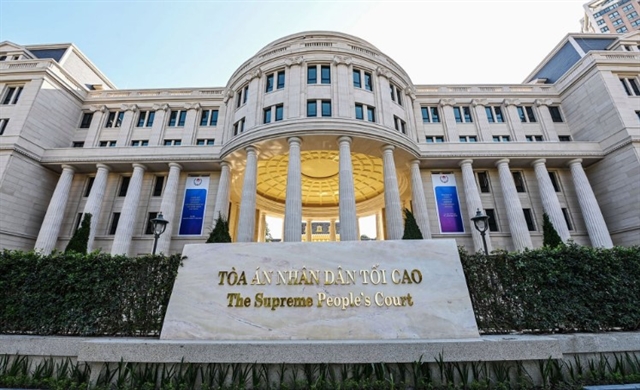 Politics & Law
Politics & Law

 |
| The Supreme People’s Court headquarter. — Photo courtesy of the Supreme People’s Court |
HÀ NỘI — Foreigners serving as judges of the specialised court must have previously been judges, lawyers or experts with appropriate specialised knowledge, and have at least 10 years of experience adjudicating cases within the jurisdiction of the specialised court.
The regulations are defined in the draft Law on Specialised Court. The Supreme People’s Court is currently soliciting opinions on the law, which will serve as an important legal basis for adjudicating and resolving disputes related to investment and business activities at the International Financial Centre.
The draft law regulates organisational structure, duties and powers of the specialised court at the International Financial Centre.
It also governs procedures and legal applications to ensure the operation of the specialised court.
The specialised court’s organisational structure includes the specialised court of first instance, the specialised court of appeal and the supporting apparatus.
It will adjudicate and resolve disputes arising from investment and business activities at the International Financial Centre; apply foreign laws, foreign precedents, international commercial customs and perform other tasks and powers as prescribed by law.
The term of office for foreign judges appointed to the specialised court, as well as for Vietnamese citizens appointed to the specialised court, is five years from the date of appointment.
The specialised court of first instance has the authority to resolve and adjudicate disputes and claims according to the first-instance procedure as prescribed. The specialised court of appeal has the authority to resolve and adjudicate appeals against judgments and decisions of the specialised court of first instance.
The chief justice of the specialised court decides cases within the jurisdiction of the specialised court in cases of jurisdictional disputes with the chief justice have the final decision.
The draft law states that the State has special incentive policies regarding remuneration, salary, allowances and other benefits for judges, court clerks, experts and employees at the specialised court.
Accordingly, remuneration, salary, allowances and other benefits will not be lower than those applied to officials, public employees, civil servants and employees working in the executive and supervisory agencies of the International Financial Centre, and must not be reduced during the term of service.
There is also a special policy for training and fostering judges, court clerks, experts and employees to meet the needs of case resolution at the specialised court.
Regarding procedural regulations at the specialised court, the process will be fast, efficient, minimise time and simplify procedures compared to resolving cases under regular procedures.
In addition, some provisions are added to uphold the adversarial principle of trial in accordance with traditions of common law countries.
Documents and evidence submitted by one party to the court must be sent to the other parties. Moreover, the court does not collect evidence but bases the adjudication and resolution of cases on the documents and evidence provided by the parties, which have been verified by the court as well as the results of the trial.
Relating to the enforcement of judgments and decisions of the specialised court, the draft law stipulates that judges of the specialised court have the authority to issue enforcement decisions for judgments and decisions that have legal validity.
The enforcement organisation is conducted according to the law and guidelines of the Supreme People’s Court. — VNS




